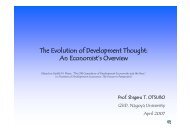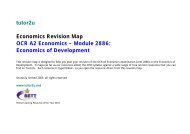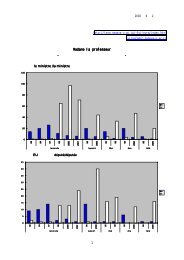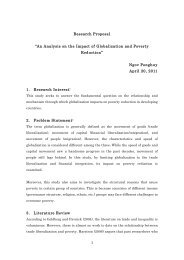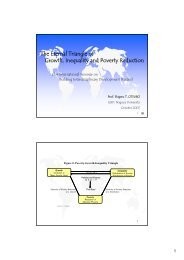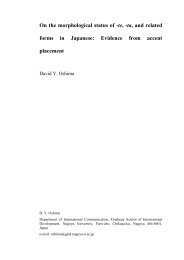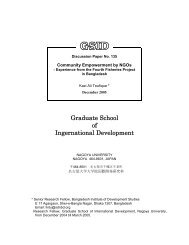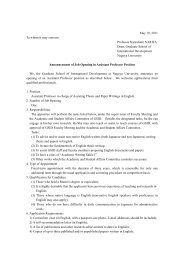Report
Report
Report
You also want an ePaper? Increase the reach of your titles
YUMPU automatically turns print PDFs into web optimized ePapers that Google loves.
116 QUANTIFICATION OF BENEFITS FROM ECONOMIC COOPERATION IN SOUTH ASIA<br />
construction industry in the country. 6 The CDB is<br />
responsible for registration, classification and monitoring<br />
of consultants, contractors, and their performance.<br />
There is nothing in its rules and regulations which could<br />
suggest the presence of any discriminatory provisions.<br />
Since the country heavily depends on other countries’<br />
assistance in the area of construction particularly on<br />
India there does not seem to be any explicit discriminatory<br />
provisions.<br />
Current development theories contend that<br />
infrastructure together with integration into the world<br />
economy is essential for economic development<br />
(UNESCAP 2003). Small countries such as Bhutan face<br />
considerable challenges, as the cost of infrastructure<br />
provision is very high, and successful integration is<br />
constrained by several structural and locational<br />
problems associated with smallness and remoteness.<br />
The high costs of infrastructure provision makes small<br />
countries heavily dependent on external assistance for<br />
capital investments.<br />
Bhutan should undertake liberal commitments in<br />
the sector that will help it improve its infrastructure.<br />
This will have very positive implications for tourism<br />
services. It should also make its Mode 4 regime liberal<br />
so that other South Asian countries can gain market<br />
access for their professionals and workers. This will<br />
improve the overall quality of labour in the country<br />
and may lead to skill enhancement in the local labour.<br />
Other Regulations Affecting Trade in<br />
Construction Services<br />
Recognition<br />
As already noted, Article VII of GATS specifies that<br />
for the fulfillment of its standards, licensing or certification<br />
of service suppliers, a member may recognise the<br />
education and experience obtained or licenses or<br />
certification granted in a country. This article thus urges<br />
members to recognise the educational or other<br />
qualifications of service suppliers of other countries.<br />
Recognition related issues are of crucial significance to<br />
developing countries including South Asian ones as lack<br />
of such recognition of professional qualifications can<br />
act as a formidable barrier to providing services<br />
especially via movement of natural persons. As per the<br />
provision of this article, members have an obligation<br />
to notify the Council for Trade in Services (CTS) of<br />
existing recognition agreements as well as new ones<br />
that are negotiated. However, it appears that not all<br />
such agreements are notified. It can therefore be argued<br />
6<br />
About the CDB, http://www.cdb.gov.bt/aboutcdb.htm, last visited on 24 October 2007.<br />
that adequate opportunity is not being provided to<br />
other members to indicate their interests in participating<br />
in these negotiations. In view of the ineffectiveness of<br />
notification obligations one would tend to consider this<br />
article as any other best endeavour clause (Kumar<br />
2005). Further, the problem is that there is no provision<br />
for mandated review or negotiation on this article to<br />
make desired improvement.<br />
Perhaps the most important domestic policy issue<br />
to be addressed relates to the recognition of qualifications.<br />
Lack of recognition of qualifications often constitutes<br />
a major barrier to entry by South Asian service<br />
suppliers, who are largely outside existing recognition<br />
initiatives and thus at a disadvantage in various services<br />
where licensing and certification requirements apply<br />
to entry (Chanda 2005). However, India has made an<br />
historical attempt by having taken some steps in this<br />
direction in its agreement with Singapore- CECA. The<br />
CECA has a list of professionals and both parties are<br />
expected to recognise their qualifications. In the context<br />
of South Asia it is suggested that a similar exercise<br />
should be carried out. However, here apart from professionals,<br />
the list must also include less skilled and semiskilled<br />
workers.<br />
At the South Asian level developing MRAs with a<br />
view to recognising qualifications of engineers,<br />
architects, town planners, and all other skilled or semiskilled<br />
workers will be immensely beneficial to the<br />
South Asian countries in facilitating trade in construction<br />
services. Having the precedence of India–Singapore<br />
agreement and an agreement in the pipeline with Sri<br />
Lanka, developing MRAs in the sector may not be that<br />
daunting. One bilateral agreement will enable the region<br />
to apply it to all other countries. The most important<br />
point is that since Mode 4 is the most restricted mode<br />
at the regional level the gains will also be most from<br />
liberalising it and MRAs would play an instrumental<br />
role in facilitating the presence of natural persons.<br />
However, since the issue of MRAs is complex it deserves<br />
more detailed discussion and accordingly, this has been<br />
discussed in the Chapter 5.<br />
Classification issue: In view of related professional<br />
services being placed under the business services sector<br />
under W/120 classification, Cuba argues that members<br />
should hold discussions within the purview of the<br />
existing interrelationship between the construction and<br />
related engineering services sector and the professional<br />
services sector with regard to architectural services,<br />
engineering services, integrated engineering services and




